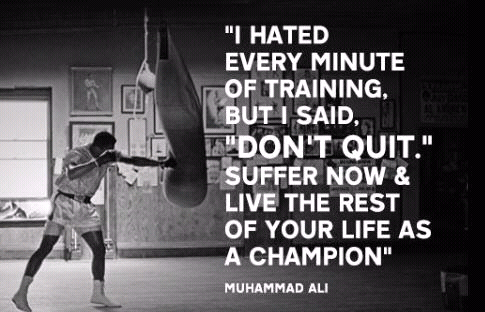
“I Need To Get Motivated”
July 9, 2017 // Wellness
“Motivated” is a title we use to recognize consistent, good behaviors.
Motivation is assumed.
Motivation is short-lived.
Motivation is not absolute.
When clients tell me “I need to get motivated”, I know that there is something broken in their regular health routine.
In this series, I outline the tips, tricks and strategies to jumpstart “motivation” and maintain consistencies in your health routine(s).
Cut It In Half
I then focus solely on this target, giving no thought or care to anything after this number.
Examples:
- 2 miles to go? Let’s keep a good pace for the next mile.
- 30 seconds left on the clock? Let’s just get through the next 15.
- 12 push-ups left? Let’s master these next 6.
[You can also apply this trick to almost any numerical goal with great success.]
Quit Tomorrow
The article also explains the phenomenom of
Self-Herding:
“Many of our small, daily decisions are governed by our emotional state in the moment.”
The Take-Away: Don’t overreact to the temporary pain, discomfort or moment of weakness. Instead, quit tomorrow.
Secrets to a Strong Mind
- Talk back to doubts.
- Distract yourself.
- Get uncomfortable.
- Find people who push your limits.
- Do the things you hate.
The Take-Away: The more we look at a challenge as an opportunity for growth, the less fearful we are at pushing ourselves to strive for new improvements.
The 2 Infamous Words of Self-Sabatoge
Whoa. Things just got real.
After studying behavioral psychology and working with hundreds of nutrition clients, I found that these two words precede a rebellion from any structured nutritional pursuit.
When compliance to a plan or strategy seems too demanding, these two words seem to slip out just as someone has decided to give up their pursuit and effort(s).
A sample internal conversation:
“I should keep my dinner choices light and clean. I haven’t had time to workout at all this week and I really don’t need all of these carbs if I’m just sitting at my desk all day lately…”
[a momentary pause to consider pro’s and con’s to the next decision]
“…Ah, f*ck it! I’ll focus better next week. Let’s take the night off with my diet.”
When you hear those two words in your head, a red flag should go up.
When you hear yourself saying “F*ck it!”, stop what you’re doing and assess the situation:
- Am I feeling overwhelmed?
- What are the stressors affecting me right now?
- How will my rebellion make me feel tomorrow?
By asking nonjudgmental questions to ourselves, we can clearly identify what has us bothered and highlight the effects of our rebellion from our health routine(s). By isolating the issue(s), we are less likely to continue down a path of self-sabatoge.
The Take-Away: Pay attention when you hear “F*ck it”. This is a knee-jerk response. Assess the situation and consider the impact of your rebellion.
Silence The Suck
Focus on your good behaviors, not your bad habits.
When you shift your mindset from negative self-talk to positive self-talk, you replace guilt and shame with empowerment and focus.
Negative self-talk adds unnecessary stress and pressure to your efforts. When the stress is constant, the efforts are affected. The brain and body hit a wall and are beat down. This state of fatigue will wear you down and undermine any progress.
Instead of feeling like a failure because you ate bread, pasta or chocolate, focus on what you’re doing well.
Recognize small steps of progress like:
- “I’m now having vegetables with each meal.”
- “I’ve been going to bed before 11pm almost every night this week.”
- “I’m finishing my Liter water bottle at work everyday.”
The more good behaviors you recognize, the more energy you allow yourself to focus on increasing these good behaviors, and adding new ones.
The Take-Away: Recognize and applaud small feats. Anything above zero is progress.


